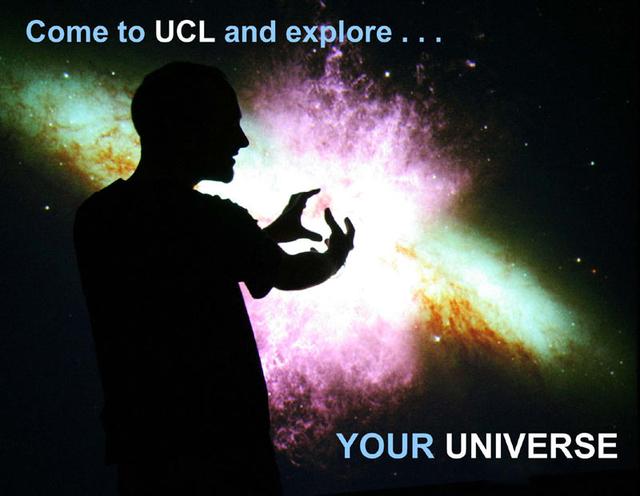In 2016 we looked at new ways of seeing and learning about the Universe, and discussed one of the biggest questions of all - is there life on other planets?

The Universe is a fantastic place, but if we only ever observed it with our eyes we would never see its most amazing phenomena. In this talk I discussed what our galaxy, the Milky Way, looks like in different wavelengths before moving on to discover the exotic entities that can only be observed in the wavelengths that are invisible to our eyes. I finished by showing the current limits of what we can see and what we hope the next generation of telescopes and satellites will reveal to us.
Speaker: Dr Francisco Diego (UCL Physics & Astronomy)
Dr Francisco Diego talked about the Think Universe! project, a one-term integrated science programme to be taught in schools to pupils aged 9-12.Think Universe! deals with the fundamental nature of the visible Universe, from its very simple and still mysterious origin, to the complexity and diversity around us today. We followed the cosmic time line and explore a metaphorical cosmic forest where vast numbers of trees of diversity accidentally grow and vanish. We faced the relevant insignificance of the human existence, that has only started as a tiny twig on one of those trees. A single human family that migrated from central Africa only a few thousand years ago. We meet our destiny, where we must learn to be kind to one another and preserve this fragile and unique paradise planet that we call Earth.
In this lecture, we learned about the development of this project and its major challenges ahead. The audience discussion at the end was very stimulating.
(NOTE: Think Universe! has support from the Science and Technology Facilities Council for its essential phase of teacher training).
What is life? How does it start? With over 2,000 confirmed exoplanets, and the probability of billions more in our galaxy alone, is the emergence of life inevitable? And if it is inevitable, then where are the aliens? Our expert panel guided the audience on the most fascinating challenges to human culture.

Each panelist introduced a topic, followed by a long and diverse discussion with the audience.
From geology to biology, the origin of life in the universe
Speaker: Dr Nick Lane (UCL Genetics, Evolution & Environment)
How does a sterile planet give rise to living cells? Some geological environments have the perfect flow of energy to drive the formation and organization of organic molecules and eventually cells like bacteria. But getting from bacteria to more complex cells like our own is a much harder transition.
The contribution of comets and meteorites to the origin of life
Speaker: Dr Zita Martins (Imperial College London)
Dr Martins talked about the delivery of the building blocks of life to Earth by comets and meteorites between 4.6 to 3.8 billion of years ago, and how this may have contributed to the origin of life on Earth.
The Search for Life on Mars
Speaker: Dr Peter Grindrod (Department of Earth and Planetary Sciences, Birkbeck)
Dr Grindrod described the ongoing search for life on Mars. This talk outlined our exploration of the planet, the evolution of habitability and the chances of finding life in the coming decades.
Where are the aliens? The Drake equation revisited
Speaker: Professor Ian Crawford (Department of Earth and Planetary Sciences, Birkbeck)
Based around a discussion of the famous 'Drake Equation' (which provides a rough estimation of the number of civilisations in our galaxy), this talk discussed what modern results in astrobiology tell us about the prospects for finding intelligent life elsewhere in the universe.
Twinkle: a mission to unravel the story of planets in our galaxy
Speaker: Professor Giovanna Tinetti (UCL Physics & Astronomy)
Professor Tinetti talked about the upcoming Twinkle mission, which will observe the atmospheres of planets around distant stars. Twinkle will be able to reveal, for the first time, the chemical composition, weather and history of worlds orbiting distant stars. The Twinkle satellite will be built in the UK and launched into a low-Earth orbit within 3 to 4 years.
 Close
Close


